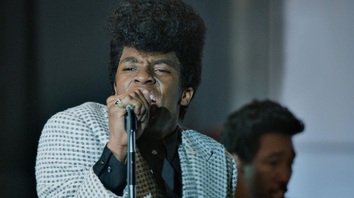Review:
"Get On Up"

Release Date: Aug. 1, 2014
Rating: PG-13 Running Time: 139 minutes So much for dancing solving most of James Browns’ problems. Director Tate Taylor’s biopic Get On Up begins and ends with the Godfather of Soul’s 1988 arrests that eventually led to him serving three years in prison. Taylor, though, isn’t interested in character assassination despite an opening scene that all but paints Chadwick Boseman’s aging Brown as a figure of ridicule. Brown’s 1988 run-ins with the law serve as justification for Taylor to often portray the stubborn and egotistic Brown as his own worst enemy. Not that this rag-to-riches story about talent and innovation overcoming adversity ever comes down too hard on Brown. Get On Up’s so forgiving of Brown that his history of domestic violence is addressed with a shrug, as if to declare that this is the unfortunate but acceptable cost to life with a creative genius. If Get On Up doesn’t hold Brown accountable for his off-camera assault of his second wife Deidre “Dee-Dee” Jenkins, it certainly doesn’t find anything wrong in Brown’s contentious relationship with his friends, family, and colleagues. This is best exemplified by Brown’s decades-long association with singer/songwriter Bobby Byrd, whom Nelsan Ellis plays with such deference that it’s painful to watch Brown treated as dirt in Get On Up. The only person who matters to James Brown is James Brown, and Byrd willingly accepts his position under “Mr. Brown” until it finally breaks him. With the exception of father figure Ben Bart, the manager whom Dan Aykroyd portrays as slow on the uptake but completely devoted to his client, no one else in Get On Up is deserving of Brown’s respect. Especially his mother Susie (Viola Davis). Brown didn’t grow up in a loving environment in Augusta, GA.—his mother ran off and left him with his father, who would later abandon him at the brothel run by his aunt—so his rejection of his mother decades later is understandable. Brown’s harsh childhood left him defiance to the core and independent to a fault, and it’s these traits that inform every good and bad moment to be found in Get On Up. Working from an intricately structured screenplay by Jez Butterworth and John-Henry Butterworth, Tate goes back and forth in time to show how the young Brown’s experiences would later serve him well or poorly in later life. It’s hard to deny that Brown had a great deal to overcome before he set foot on the road to success or that he left everything on stage whenever he performed. Occasionally, Get On Up allows Brown to break down the fourth wall to talk directly to the audience. While this appears to be an extension of Brown’s penchant to refer to himself in the third person, Brown’s efforts to directly solicit our pity or approval feels unnecessary and distracting. While Get On Up struggles to find its footing, the same cannot be said about Chadwick Boseman. The man who played Jackie Robinson in 42 may not look like James Brown—just as Joaquin Phoenix couldn’t pass himself off as Johnny Cash’s double in Walk the Line—but he captures the sense of self and inherent showmanship that made James Brown the James Brown. The cocksure Boseman talks the talk, walks the walk, and dances the dance. While Boseman doesn’t sing--Get On Up employs Brown’s live and studio recordings—his footwork is a marvel to behold. Bruno Mars has nothing on Boseman. It’s debatable whether Get On Up will help or hurt Brown’s legacy but there’s no denying that Boseman possesses some of the star quality that made Brown a legend. Robert Sims Aired: July 31, 2014 Web site: http://www.getonupmovie.com/ |
|
